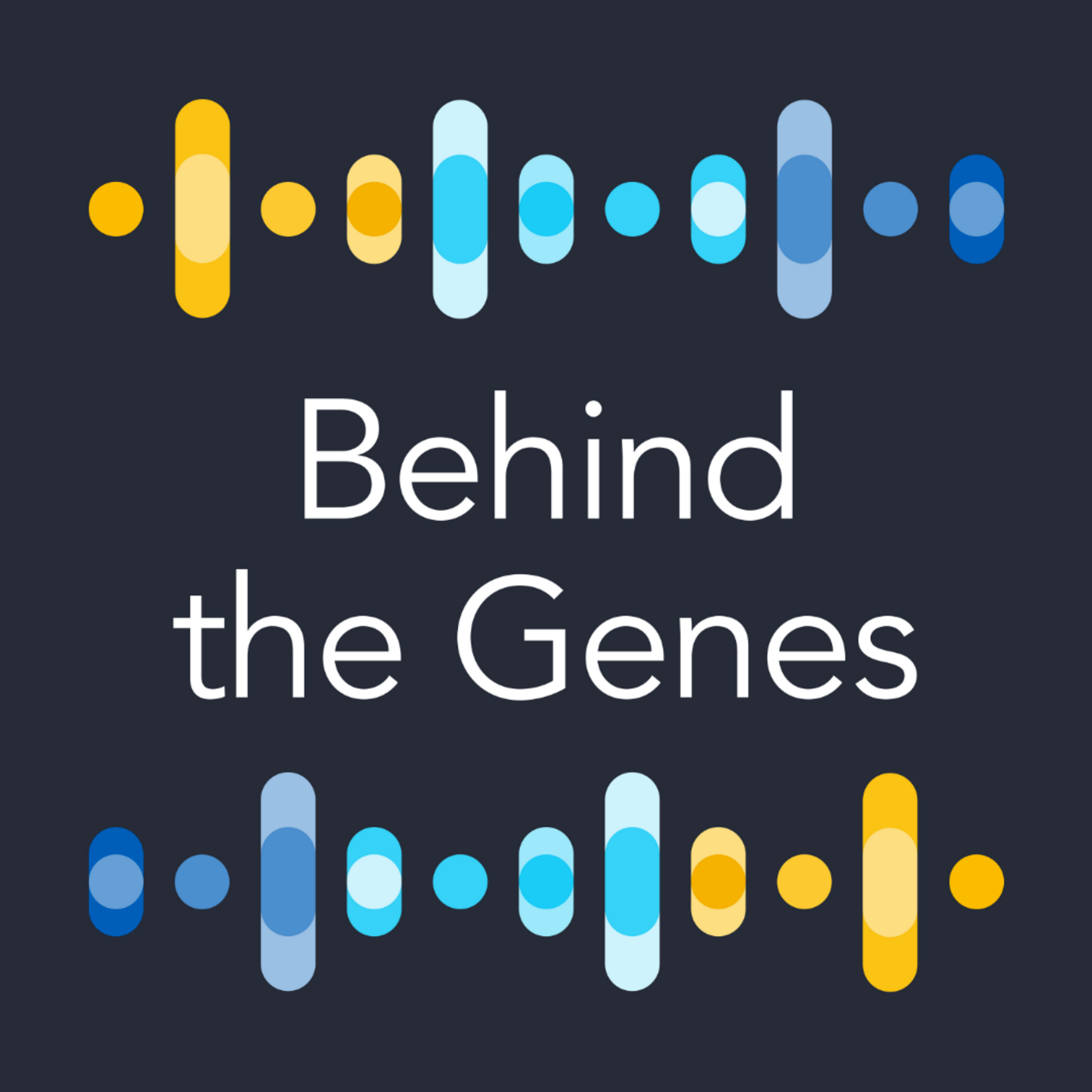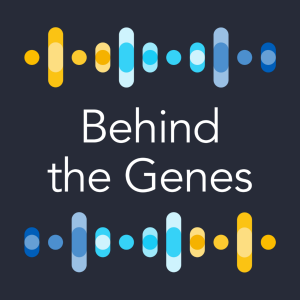
We are Genomics England and our vision is to create a world where everyone benefits from genomic healthcare. Introducing our refreshed podcast identity: Behind the Genes, previously known as The G Word. Join us every fortnight, where we cover everything from the latest in cutting-edge research to real-life stories from those affected by rare conditions and cancer. With thoughtful conversations, we take you behind the science. You can also tune in to our Genomics 101 explainer series which breaks down complex terms in under 10 minutes.
We are Genomics England and our vision is to create a world where everyone benefits from genomic healthcare. Introducing our refreshed podcast identity: Behind the Genes, previously known as The G Word. Join us every fortnight, where we cover everything from the latest in cutting-edge research to real-life stories from those affected by rare conditions and cancer. With thoughtful conversations, we take you behind the science. You can also tune in to our Genomics 101 explainer series which breaks down complex terms in under 10 minutes.
Episodes

Wednesday Feb 16, 2022
Bilal Mateen and Evan Tachovsky: Diverse data
Wednesday Feb 16, 2022
Wednesday Feb 16, 2022
“We have huge imbalances in our data in the world of genomics, and datasets all over the world are dominated by individuals of European ancestry. By the time we get to the point where a dataset is imbalanced, its actually built on years if not decades of individual decisions and processes."
In this week's episode of The G Word, Maxine Mackintosh is joined by Bilal Mateen, Clinical Technology Lead at the Wellcome Trust, and Evan Tachovsky, Director and Lead Data Scientist at the Rockefeller Foundation.
They discuss funding and funders, the world of health and data science and imbalanced datasets. They also talk about their backgrounds and equity and diversity.

Wednesday Feb 09, 2022
Wednesday Feb 09, 2022
“Although there is this sense where you don't really find as many women in science, and when we get missed out of science, I think we have been really lucky and fortunate to work with incredible women in large numbers. We're quite lucky to find the experiences that we have.” […] “Life is so precious, we really shouldn't be spending any time doing things we don't enjoy.”
In this week's episode of The G Word, Dr Ellen Thomas, Clinical Director and Director of Quality at Genomics England, is joined by Arzoo Ahmed, Ethics Lead of the Newborn Genomes Programme, and Cassandra Smith, Senior Bioinformatician, both at Genomics England. Ellen worked on the delivery of the 100,000 Genomes Project and Cassie did her PhD using bioinformatics to study parts of mitochondria before joining the operations team at Genomics England. Arzoo completed her MPhil in Mediaeval Arabic Thought before moving onto the Nuffield Council on Bioethics and then joining the Ethics Team here at Genomics England.
In this discussion, these three brilliant women talk through their roles and what inspired them to pursue a career at Genomics England. In celebration of the International Day of Women and Girls in Science, they also discuss the challenges they have faced along the way and how being a woman has impacted their career.

Wednesday Feb 02, 2022
Serena Nik-Zainal: Personalised treatment for cancer patients
Wednesday Feb 02, 2022
Wednesday Feb 02, 2022
“I hope it will happen in our lifetime, that we will start to learn how to use the totality of information that's available on tumours. And I don't just mean genomics, I mean any of it - including all the bits around the tumour, the microenvironment, the immune system. In the last 10 years alone, cancer research has grown phenomenally. It's been extraordinary to be involved in all of it. It's a very real privilege to be to be in this space.”
In this week's episode of The G Word, Chris Wigley is joined by Serena Nik-Zainal, a consultant in clinical genetics, a Cancer Research UK Advanced Clinical Scientist at the University of Cambridge and an Honorary Consultant in Clinical Genetics at Addenbrooke’s Hospital in Cambridge. She was the first woman to win the Josef Steiner Cancer Research Award in 2019.
Serena discusses sharing data, personalised treatment for cancer patients and the impact of the 100,000 Genomes Project. She also talks about the involvement of participants, cancer research and the need for genomic data diversity.

Wednesday Jan 26, 2022
Ben Goldacre: The use and safety of data
Wednesday Jan 26, 2022
Wednesday Jan 26, 2022
“If you want to reduce suffering and death, you don't do that by depositing a PDF in a journal archive that gets read by eight people. You've got to go out there in the real world, you've got to change activity and behaviour.”
In this week's episode of The G Word, Chris Wigley is joined by Ben Goldacre, Director of TheDataLab at Oxford University, author and and lead on an upcoming review about better use of NHS data.
He discusses the use and safety of data, his book Bad Pharma and OpenSAFELY. He also talks about his early career and connecting data.

Wednesday Jan 19, 2022
David Bick: Newborn sequencing
Wednesday Jan 19, 2022
Wednesday Jan 19, 2022
“We want to help families with rare conditions which are treatable and families with less rare conditions which are treatable. I think this equity is an important principle in terms of how we take care of children in the UK.”
In this week's episode of The G Word, Vivienne Parry is joined by David Bick, Clinical Advisor for the Newborn Genomes Programme and former Faculty Investigator and Chief Medical Officer at HudsonAlpha.
He discusses his experience with newborn sequencing, why whole genomes rather than exomes is the way forward and setting up a newborn programme. He also talks about what led him to genomics and the reasons he came to the UK.

Thursday Jan 13, 2022
Jessica Morley: Ethics and AI
Thursday Jan 13, 2022
Thursday Jan 13, 2022
“How do we better use big health data, both for the population’s health and for the health of individuals? There are an enormous number of ethical implications, and we must do our best to consider them.”
In this week’s episode of The G Word, Lyra Nightingale is joined by Jessica Morley, Policy Lead at Oxford DataLab, former Tech Advisor at the Department of Health and Social Care and specialist in ethics and AI.
Jessica discusses the gap between theory and practice in AI ethics, legislation and regulation in biotech and ethical mistakes versus ethical successes. She also discusses her background and her work with Oxford DataLab.

Wednesday Jan 05, 2022
Dr Christina Waters: Patient involvement
Wednesday Jan 05, 2022
Wednesday Jan 05, 2022
“If we can identify more quickly what is going on with children, then we can treat them faster, and hopefully halt progression or have early intervention, or make a change, bring communities together, so we can understand what's similar and different across these different diseases.”
In this week’s episode of The G Word, Vivienne Parry is joined by Dr Christina Waters, Senior Vice President of Genomic Insights and Solution at Congenica and Founder of Rare Science, a non-profit that accelerates treatments for children with rare diseases.
Christina discusses her work with Rare Science, patient involvement and genetic interpretation. She also discusses her upbringing and the merits of industry.

Wednesday Dec 29, 2021
Chris Wigley: Celebrating 2021 - end of year highlights
Wednesday Dec 29, 2021
Wednesday Dec 29, 2021
“It’s been a fantastic year of conversations with an incredible cast of people, and we have learned so much from each of them. What our discussions show is we are on the right track but have plenty more to do in 2022 – and beyond. Thanks so much for joining our conversations, and hope to see you again for The G Word next year”
In this week’s episode of The G Word, Chris takes a look back at 2021.
He remembers chats with Dr Kenny Baillie, several members of the Participant Panel, Baroness Nicola Blackwood, Dr Adam Rutherford, Dr Natalie Banner and many more.
He recalls conversations about the need to view people holistically, consider their situations and hear their voices. He discusses lessons learnt about breaking stereotypes, getting young people into STEM, data, disabilities, long-term illness and patient choice.
He also talks about the podcast’s original aims: about how it was created earlier in the year to get more people familiar with genomics as a whole, in as many ways as possible, whether in the context of its use in medicine transparent and ethical use of people’s data, or innovation in the tech sector.

Wednesday Dec 22, 2021
Matt Brown: How your environment impacts your genome
Wednesday Dec 22, 2021
Wednesday Dec 22, 2021
“Now, of course, we've got multiple new technologies coming around. Each of them is going to have areas where they're going to completely enable resolution of key aspects of diseases and lead to the development of much better understanding of disease pathogenesis, and ultimately to better treatment of diseases.”
In this week's episode of The G Word, Chris is joined Matt Brown, our new Chief Scientific Officer. Formerly Director of NIHR Guys and St Thomas’ BRC and Director of Genomics at Queensland University of Technology, he played a significant role in the development of genome-wide association study (GWAS) methodology and is a fellow of both the Australian Academy of Sciences and the Australian Academy of Health and Medical Sciences.
He discusses his priorities in his new role, how your environment impacts your genome and his hopes for 2022. He also talks about his early career and working with the Participant Panel.

Wednesday Dec 15, 2021
Fyodor Urnov: Putting our ancestors in a Tesla
Wednesday Dec 15, 2021
Wednesday Dec 15, 2021
"We only learned to change human DNA 10 years ago; we as a species are 200,000 years old. So gene editing to treat disease is not even in its infancy - it's in its first minute of being born. To say that we have no idea whether to use it to make changes to future generations would be the understatement of all time. I mean, this is the equivalent of taking our ancestors who roamed Neolithic Europe and putting them in a Tesla."
In this week's episode of The G Word, Chris is joined by Fyodor Urnov, Director of Technology & Translation at the Innovative Genomics Institute and Professor of Molecular and Cell Biology at the University of California, Berkeley. Listed on the 2014 Thomson Reuters list as one of 'The World's Most Influential Scientific Minds', he has authored over 100 scientific publications, invented more than 130 US patents and won the Presidential Award for Excellence in Teaching at Brown University.
Fyodor discusses genome editing, his involvement in the US's effort to test for COVID-19 and CRISPR technology. He also talks about his education and academia.
